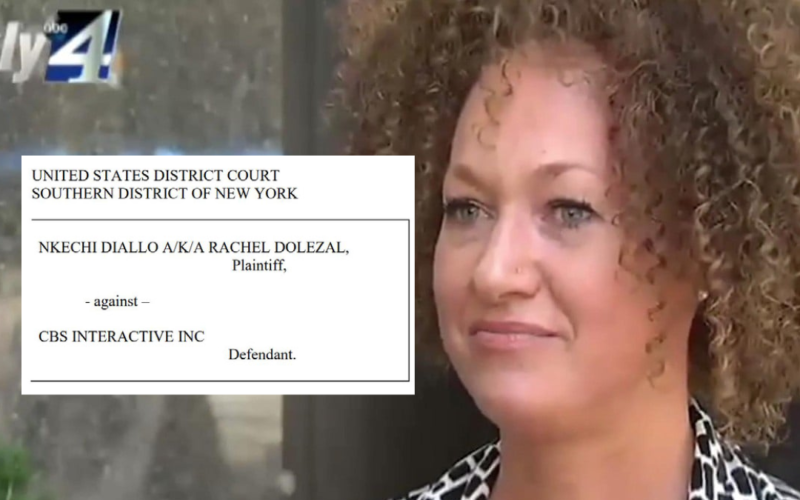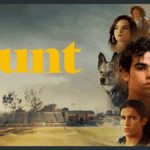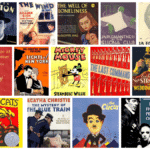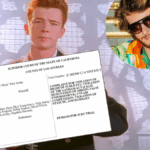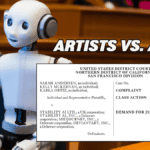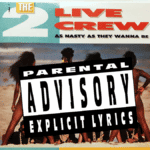Rachel Dolezal, the woman accused of misrepresenting her racial background, has filed a new infringement lawsuit against CBS Interactive. Is she weaponizing copyright?
Rachel Dolezal, who now goes by the name Nkechi Diallo, became the subject of intense public scrutiny back in 2015 after it was revealed that she lied for years about being black. Dolezal, then a college instructor and NAACP chapter president in Spokane, Washington, was accused of cultural misappropriation, and the whole episode set off a national debate about racial identity.
Now, in 2021, Dolezal may find herself at the center of a new controversy. Earlier this week, she filed a lawsuit for copyright infringement against CBS Interactive over a photograph CBS used in a 2015 Entertainment Tonight Online article about her scandal. In the photo, Dolezal appears standing next to someone the complaint refers to only as an unidentified “gentleman”:

Notably absent from Dolezal’s complaint is any mention of the role this particular photo played in leading to her being outed as a white woman. The man in the photo, whom Dolezal previously identified as “my dad” in social media posts, was later revealed to be Albert Wilkerson Jr., who had worked with Dolezal but was not her father. And a few months after the image was posted, Dolezal’s parents, who are both white, came forward to announce that Dolezal was actually their daughter and that she was not, in fact, African American.

After a local Spokane news reporter asked Dolezal point blank “Are you African American?,” she was caught off guard, and quickly left the interview. In the media frenzy that followed, Dolezal admitted that while she was born to Caucasian parents, she identified as a Black woman.
Nkechi Diallo aka Rachel Dolezal v. CBS Interactive
In her new lawsuit filed in New York federal court, Dolezal alleges that she owns the copyright in the photograph depicting her and the man she had previously identified as her father. Dolezal claims that the CBS-owned website ETonline.com infringed the photo by reproducing it without permission in a June 2015 article about the controversy.
Curiously, the complaint (read here) refers to the work at issue as a “self-portrait photograph” taken by Dolezal. But based on Dolezal’s pose in the photo, it doesn’t look like a selfie. And if the photo was in fact taken by a third party, that person would own the copyright unless there was a later assignment. At best, this would contradict Dolezal’s allegation that she was the author of the photo. At worse, she would have no standing to pursue the case.
This isn’t the first copyright infringement claim Dolezal has brought against the media. In 2019, Dolezal, then represented by notorious copyright troll Richard Liebowitz, filed a lawsuit against the publisher of Paper Magazine for using a photo from her Instagram account in a story. The lawsuit was voluntarily dismissed in early 2020 based on Liebowitz’s previous allegations that photo agency Polaris had been granted an exclusive license in the photograph, thereby depriving Dolezal of standing to sue.
Weaponizing Copyright
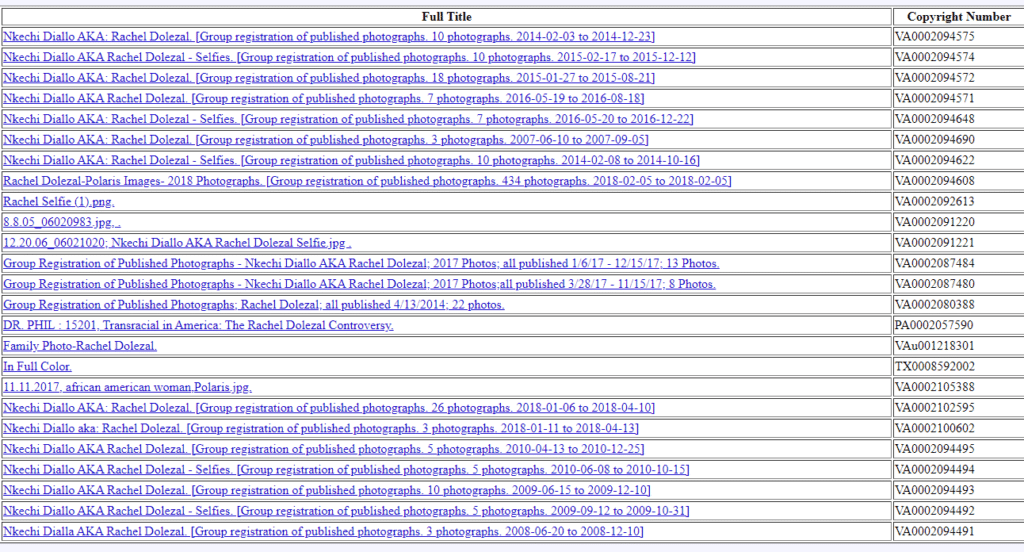
Based on my quick review of Copyright Office records, it appears that Dolezal has actually registered dozens of photographs of herself, beginning in 2018. This raises a fairly obvious question: why?
While the answer may not be quite as obvious, the history surrounding the Dolezal controversy certainly raises suspicions that she may be using the threat of copyright infringement lawsuits to purge photos she no longer wants in the public eye.
Dolezal certainly wouldn’t be the first person to do so. In a forthcoming law review article, professor Cathay Smith writes about the increasingly widespread phenomenon of “weaponizing copyright.” This refers to the use of copyright law, not to protect one’s economic interests in a copyrighted work, but rather to vindicate what are fundamentally non-copyright interests.
The practice isn’t per se unlawful—and it isn’t necessarily a bad thing. Based on my experience, copyright law can sometimes be the the only effective tool to protect what are probably more accurately seen as privacy or reputational interests—think using the DMCA to combat revenge porn. And earlier this year I wrote about Dr. Seuss’ Enterprises’ decision to stop publishing several Dr. Seuss books containing racially-insensitive content.
But there are plenty of situations in which copyright has been used to silence criticism and legitimate speech, to “erase” facts, or to punish or retaliate against perceived wrongdoers. Examples given by Professor Smith include Harvey Weinstein threatening Ronan Farrow with copyright infringement to try to stop him from publishing information about Weinstein’s sexual misconduct, and Dr. Drew filing takedown notices to remove dismissive statements he made about COVID-19.
Sometimes, copyright law is even weaponized by those who don’t own copyrights. Earlier this year, the Beverly Hills Police department was accused of purposely playing loud music like Sublime’s “Santeria” while being filmed by the public in order to trigger content filters that would get the videos taken offline.
As far as Dolezal goes, it’s unclear whether her lawsuit is an attempt to silence or merely an effort to earn some money. Either way, she doesn’t have a very strong case. CBS’ use of her photo almost certainly qualifies as fair use, if she even owns the copyright in the first place. Plus, because Dolezal didn’t register her copyright until three years after the defendant’s article was published, she won’t be entitled to attorneys’ fees or statutory damages even if she is able prove infringement.
CBS certainly has the money and legal wherewithal to vigorously defend itself. But not all accused infringers are in the same position. Copyright can be weaponized, and even the threat of complaints like Dolezal’s can and do cause defendants to remove potentially offending material rather than fight what are often expensive infringement lawsuits. And in the process, history can be erased.
Here’s a copy of Dolezal’s complaint. I’d love to hear your thoughts, either in the comments below or @copyrightlately.
UPDATE—Well, that didn’t last long. Check out what happened with Dolezal’s lawsuit here.
View Fullscreen
